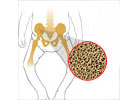High consumption of folate can increase the risk of peripheral damage in older adults with a common genetic variation, claims a new study.
Highlights
- Excessive consumption of folate can increase the risk of nerve damage disorder in older adults with a genetic variation.
- People who carry two copies of a genetic variation in TCN2 are likely to have vitamin B12 deficiency.
- Individuals with the TCN2 variation, who consumed more folate a day had seven-fold higher odds for peripheral neuropathy.
- Older adults should try to get folate from a balanced diet rather than depending on supplements or fortified food.
Genetic Variation in TCN2
People who carry a genetic variation in TCN2 are more likely to suffer from nerve damage. The gene TCN2 codes for a vitamin B12 transport protein. People with TCN2 variation also referred as GG can cause vitamin B12 deficiency, even if they consume recommended levels of vitamin B12.
In the United States, one in six people carry two copies of genetic variation in TCN2.
High Folate Intake Associated with Increased Risk of Peripheral Neuropathy
The researchers focused on participants who consumed more than twice the Recommended Dietary Allowance (RDA) of 800 micrograms of folate a day. Out of 171 individuals in the study population, 31 had GG variant.
Ligi Paul, Ph.D., scientist in the Vitamin Metabolism Laboratory at the USDA HNRCA, and senior author of the study, said, "Due to the prevalence of the TCN2 variant, and because the average daily folate intake for US adults over 50 is already more than twice the RDA, we believe that our findings highlight a potential concern for a large proportion of older Americans.”
"Our data suggest that older adults should keep folate intake close to the recommended amounts, and try to get nutrients from a balanced diet rather than depending on supplements," said Paul.
Vitamin B12 Deficiency in Older Adults
Vitamin B12 deficiency is more common among older adults due to decreased stomach acid production and some medications that interfere with the absorption of the vitamin from food.
Vitamin B12 is known to cause anemia and peripheral neuropathy. Consumption of folate can alleviate anemia caused by vitamin B12 deficiency. But studies conducted earlier have shown that high folate consumption could worsen neurological deficits, including peripheral neuropathy in older adults.
The new findings add evidence to the previous studies. The researchers suggest that older adults should be careful about their folate intake.
Hathairat Sawaengsri, Ph.D., of USDA HNRCA and lead author of the study, said, "Folate is a necessary vitamin and no one should think that it needs to be avoided. But in certain situations, very high intake of folate may be harmful. Vitamins and minerals should be consumed at an optimal level--not too high and not too low."
The findings of the study add to the growing evidence that high and low intake of folate can cause negative health outcomes. In the previous study conducted in mice, the researchers found that excess folic acid consumption was associated with shortening of protective structures (telomeres) on human chromosomes and can reduce the ability of the immune system to destroy cells infected by viruses.
The study is published in the American Journal of Clinical Nutrition.
Peripheral Neuropathy
Peripheral neuropathy is a nerve damage associated with vitamin B12 deficiency. Peripheral neuropathy is characterized by weakness, numbness, and pain in the hands and feet. Some of the other causes of peripheral neuropathy include infections, diabetes, traumatic exposure, inherited causes and exposure to toxins.
Food Sources of Folate
Folate is a water-soluble B vitamin that is naturally found in foods. It is an essential nutrient especially for infants, children and pregnant women (to prevent birth defects). Folate is the term for both naturally occurring in food and the synthetic form called as folic acid, which is found in fortified foods and supplements.
Approximately 35 percent of the adults in the US consume folic acid in dietary supplements, according to the National Institute of Health's Office of Dietary Supplements. Adults over the age of 50 years are at risk of consuming excess folate. The Dietary Guidelines for Americans advises that nutrients are best obtained from natural food sources. Some of the food sources of folate include,
- Liver, poultry, and pork
- Spinach, kale, cabbage, broccoli, asparagus, okra
- Beans and legumes
- Whole grain foods
- Orange and orange juice, strawberries
















